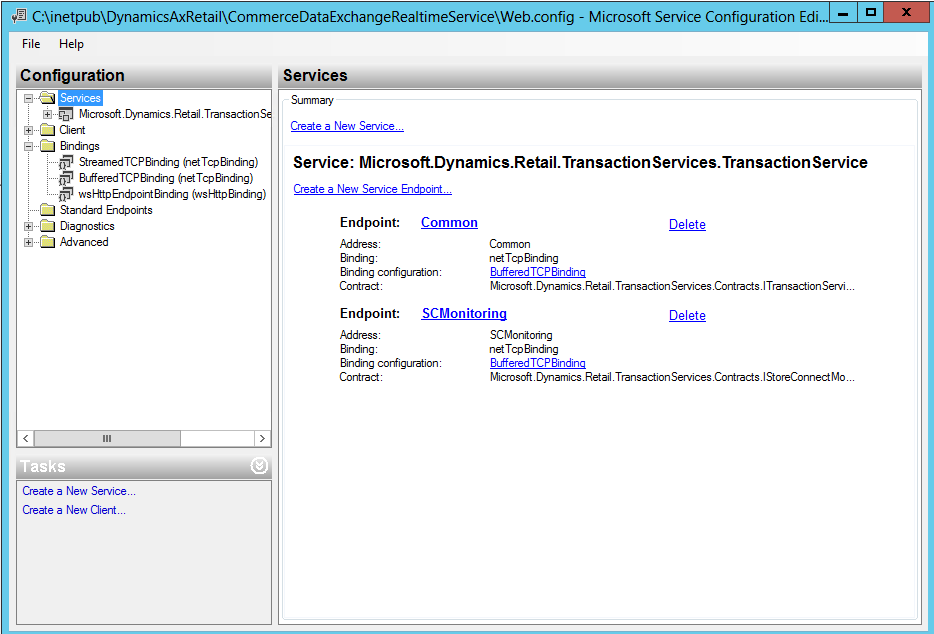AX Retail: Enabling reliable session support in POS – RealTimeServices in AX 2012 R2
Description:
We have
received some feedback from customers that inconsistence occurs when the
network connect fails during a RealTimeService operation from the POS. To
ensure that POS calls to RealTimeService is working reliable, we can enable the
reliable session in the config files. After enabling this feature, the communication
will ensure consistency in the calls.
NB: Enabling this feature might slightly decrease the performance.
Solution:
When you want to edit the Web.Config or POS.Exe.Config file it is a very good practice to
use the SvcConfigEditor.exe, which comes with the Microsoft SDK. With this tool it is very easy to see the possible values in the
different options and it provides you a good overview what is running as a service and what is running on the client.
To get the reliable session to work we have to change certain values.
- The MaxBufferSize andMaxReceivedMessageSize needs to be the same value.
- maxBufferSize=”10485760″
- maxReceivedMessageSize=”10485760″
2. The values needs to be changed.
- reliableSession ordered=”true”
- transferMode=”Buffered”
Example files: Content might have to be adjusted.
POS.EXE.CONFIG file
| <?xml version=”1.0″ encoding=”utf-8″ ?> <configuration> <configSections> <section name=”AxRetailPOS” type=”LSRetailPosis.Settings.ConfigFile.AppConfiguration, SystemSettings, Version=6.2.0.0, Culture=neutral, PublicKeyToken=31bf3856ad364e35″ /> </configSections> <AxRetailPOS OfflineDatabaseConnectionString=”” StoreDatabaseConnectionString=”Data Source=AX2012R2A;Initial Catalog=RetailSeattleStore;Integrated Security=True;Persist Security Info=False;Pooling=True;Encrypt=True;TrustServerCertificate=True” StoreId=”SEATTLE” TerminalId=”SEATTLE-1″ DATAAREAID=”usrt” /> <system.diagnostics> <sources> <!– this registers the listener with traces from a specific source –> <source name=”RetailNetTracer” switchValue=”All”> <listeners> <add name=”RollingXmlWriterTraceListener” /> </listeners> </source> <source name=”RetailNetTracerEventLog” switchValue=”All”> <listeners> <add name=”EventLogTraceListener” /> </listeners> </source> </sources> <!– this defines a listener –> <sharedListeners> <!– initializeData is the file name. If empty, it is going to be created in %TEMP%\RetailLogs\<name of exe> –> <add name=”RollingXmlWriterTraceListener” type=”Microsoft.Dynamics.Retail.Diagnostics.RollingXmlWriterTraceListener, Microsoft.Dynamics.Retail.Diagnostics” initializeData=”C:\logs\pos\” MaxLogFileInBytes=”50000000″ traceOutputOptions=”ProcessId, DateTime, LogicalOperationStack” /> <add name=”EventLogTraceListener” type=”System.Diagnostics.EventLogTraceListener” initializeData=”Dynamics AX Retail” /> <system.serviceModel> |
Web.Config file
| <?xml version=”1.0″ encoding=”UTF-8″?> <configuration> <appSettings> <!–AOSINSTANCE@AOSSERVER:AOSPORT–> <add key=”ObjectServer” value=”” /> <!–Transactoin Service AX service class name –> <add key=”TransactionServiceClass” value=”RetailTransactionService” /> <!–Transactoin Service AX service extension class name –> <add key=”transactionServiceExtensionClass” value=”RetailTransactionServiceEx” /> </appSettings> <system.diagnostics> <sources> <source name=”RetailNetTracer” switchValue=”Verbose”> <listeners> <add type=”System.Diagnostics.DefaultTraceListener” name=”Default”> <filter type=”” /> </add> <add name=”RollingXmlWriterTraceListener”> <filter type=”” /> </add> </listeners> </source> <source name=”RetailNetTracerEventLog” switchValue=”Verbose”> <listeners> <add type=”System.Diagnostics.DefaultTraceListener” name=”Default”> <filter type=”” /> </add> <add name=”EventLogTraceListener”> <filter type=”” /> </add> </listeners> </source> </sources> <sharedListeners> <add MaxLogFileInBytes=”50000000″ initializeData=”C:\logs\real\reallog.svclog” type=”Microsoft.Dynamics.Retail.Diagnostics.RollingXmlWriterTraceListener, Microsoft.Dynamics.Retail.Diagnostics” name=”RollingXmlWriterTraceListener” traceOutputOptions=”LogicalOperationStack, DateTime, Timestamp, ProcessId, ThreadId, Callstack”> <filter type=”” /> </add> <add initializeData=”Dynamics AX Retail” type=”System.Diagnostics.EventLogTraceListener” name=”EventLogTraceListener” traceOutputOptions=”LogicalOperationStack, DateTime, Timestamp, ProcessId, ThreadId, Callstack”> <filter type=”” /> </add> </sharedListeners> <trace autoflush=”true”> <listeners> <remove name=”Default” /> <add name=”RollingXmlWriterTraceListener”> <filter type=”” /> </add> <add name=”EventLogTraceListener”> <filter type=”” /> </add> </listeners> </trace> </system.diagnostics> <!– When deploying the service library project, the content of the config file must be added to the host’s app.config file. System.Configuration does not support config files for libraries. –> <system.serviceModel> <bindings> <netTcpBinding> <binding name=”StreamedTCPBinding” receiveTimeout=”00:10:00″ sendTimeout=”00:01:00″ transferMode=”Streamed” listenBacklog=”32″ maxBufferPoolSize=”67108864″ maxBufferSize=”10485760″ maxConnections=”16″ maxReceivedMessageSize=”10485760″ portSharingEnabled=”true”> <readerQuotas maxStringContentLength=”1048576″ maxBytesPerRead=”1048576″ /> <security mode=”TransportWithMessageCredential”> <transport clientCredentialType=”None” protectionLevel=”EncryptAndSign” /> <message clientCredentialType=”UserName” /> </security> </binding> <binding name=”BufferedTCPBinding” transactionFlow=”false” transferMode=”Buffered” listenBacklog=”100″ maxBufferPoolSize=”67108864″ maxBufferSize=”10485760″ maxConnections=”16″ maxReceivedMessageSize=”10485760″> <readerQuotas maxDepth=”32″ maxStringContentLength=”1048576″ maxArrayLength=”16384″ maxBytesPerRead=”1048576″ /> <reliableSession enabled=”true” /> <security mode=”TransportWithMessageCredential”> <transport clientCredentialType=”None” /> <message clientCredentialType=”UserName” /> </security> </binding> </netTcpBinding> <wsHttpBinding> <binding name=”wsHttpEndpointBinding” transactionFlow=”false” maxBufferPoolSize=”10485760″ maxReceivedMessageSize=”10485760″ textEncoding=”utf-16″> <readerQuotas maxStringContentLength=”1048576″ maxBytesPerRead=”1048576″ /> <security mode=”TransportWithMessageCredential”> <transport clientCredentialType=”None” /> <message clientCredentialType=”UserName” algorithmSuite=”Default” /> </security> </binding> </wsHttpBinding> </bindings> <services> <service behaviorConfiguration=”ReleaseBehavior” name=”Microsoft.Dynamics.Retail.TransactionServices.TransactionService”> <endpoint address=”Common” binding=”netTcpBinding” bindingConfiguration=”BufferedTCPBinding” name=”Common” contract=”Microsoft.Dynamics.Retail.TransactionServices.Contracts.ITransactionService” /> <endpoint address=”SCMonitoring” binding=”netTcpBinding” bindingConfiguration=”BufferedTCPBinding” name=”SCMonitoring” contract=”Microsoft.Dynamics.Retail.TransactionServices.Contracts.IStoreConnectMonitoring” /> </service> </services> <behaviors> <serviceBehaviors> <behavior name=”ReleaseBehavior”> <serviceMetadata httpGetEnabled=”false” httpsGetEnabled=”false” /> <serviceCredentials> <serviceCertificate findValue=”6B3B49DFAD6100A47EF623C8E471C567BF052530″ storeLocation=”LocalMachine” storeName=”My” x509FindType=”FindByThumbprint” /> <userNameAuthentication userNamePasswordValidationMode=”Custom” customUserNamePasswordValidatorType=”Microsoft.Dynamics.Retail.TransactionServices.Authentication, Microsoft.Dynamics.Retail.TransactionServices” /> </serviceCredentials> </behavior> </serviceBehaviors> </behaviors> </system.serviceModel> </configuration> |
NB. The next release of AX (Dynamics AX 2012 R3)
has reliable session enabled by default.
Author: Kim Truelsen
Date: 11/2-2014




